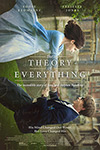 The Theory of Everything tells the story of cosmologist Stephen Hawking (played here by a terrific Eddie Redmayne), adapting a memoir written by his ex-wife Jane Wilde Hawking (Felicity Jones). It begins with their meeting at a party, Stephen the doctoral candidate and Jane the languages major. The film follows their romance through the trials and tribulations of dealing with his motor-neuron disease, which would eventually leave him nearly paralyzed and unable to speak.
The Theory of Everything tells the story of cosmologist Stephen Hawking (played here by a terrific Eddie Redmayne), adapting a memoir written by his ex-wife Jane Wilde Hawking (Felicity Jones). It begins with their meeting at a party, Stephen the doctoral candidate and Jane the languages major. The film follows their romance through the trials and tribulations of dealing with his motor-neuron disease, which would eventually leave him nearly paralyzed and unable to speak.
The movie is structured a bit strangely. The film takes the perspective of its source material, which means that much of the story is told from the perspective of Jane rather than Stephen. Much of the drama hinges on Jane's struggle with caring for the brilliant scientist, who doesn't seem to realize just how much she's giving up to be with him. But at the same time, the movie begins and ends with Stephen Hawking. Its climactic dramatic set piece doesn’t involve Jane at all, the sequence feeling like it stepped in from a completely different movie.
There is merit to the idea of the two sharing the spotlight, but this isn't exactly what happens in this movie. The clunky, mostly timid writing basically marginalizes them in alternate bursts, switching away to the other character when the material gets difficult or risky. People looking to this movie for a solid explanation of Hawking's theories will be disappointed, as its approach to the science is soft at best. And anyone looking for insight into his marriage will also find it lacking. While it's understandable that the film might want to avoid treading through the muck, it plays things a little too coy, making the drama feel inert.
The movie is handsomely staged, but there isn't much in the way of a consistent visual motif. Occasionally, the film will linger on circles or spirals, visually alluding to its subject's theories, but it doesn't quite build to anything of substance. It does all look very good, but the filmmaking mainly feels perfunctory. It works through the elements of the prestige picture, rarely taking any risks as it builds a pretty picture of the subject within.
Eddie Redmayne is really the main reason to see this film. Redmayne makes a profound transformation, disappearing into the role with a performance that goes well beyond impression. It is a grueling physical feat, but Redmayne manages to make it all feel natural. Felicity Jones is okay for maybe the first half of the movie, but she struggles to show her character growing. There’s little sense of Jane aging through the movie, which is as much a failure of the acting as it is the film’s ultimate design.
The Theory of Everything is burdened by its soft approach to everything. Rather than deal with the challenge of turning scientific theory into compelling cinema, or dig deep into the difficulty of dramatizing the main character’s infidelity, it just sidesteps it all. One could generously call it being graceful, but it would more accurately call it being tame. It decided right from the start that it really wants to tell a generic uplifting story, and it scrubs away at all the parts that may have taken away from that idea. While the main performance truly is one of the great ones, the picture never really rises to that occasion. If one is looking for more insight into Hawking as a man, you’d be better off with Errol Morris’ documentary adaptation of A Brief History of Time. Without the layer of obfuscation and prestige gloss, that movie gets closer to something truly profound.
My Rating:











